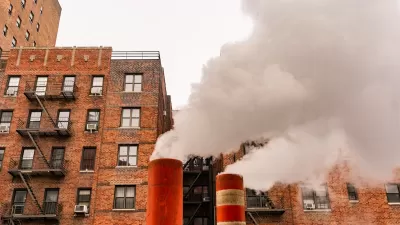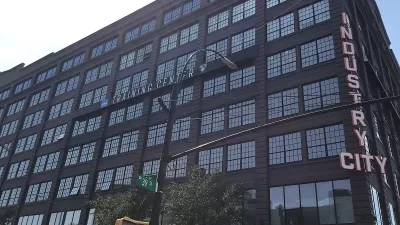A new report shows that New York City could be 90 percent carbon-free by 2050, "without breaking the bank," if it upgrades heating systems and transportation to renewable electricity, reports Taz Loomans.
"90 by 50" is a new report released by the Urban Green Council, the New York Chapter of the US Green Building Council (USGBC).
The numbers refer to how drastically New York City could cut its carbon footprint in the next 38 years by switching to renewable-sourced electricity for heating buildings and by reducing the amount of heat that escapes them.
Although inefficient buildings contribute to 75 percent of the city's carbon emissions, 21 percent come from inefficient freight and passenger rail and non-electric buses.
The city could revamp its building and transportation systems by the year 2050, cutting its carbon emissions by 90 percent, for a projected net cost of only $20 billion.
FULL STORY: New report shows how NYC could cut its carbon footprint by 90% by 2050

Planetizen Federal Action Tracker
A weekly monitor of how Trump’s orders and actions are impacting planners and planning in America.

Maui's Vacation Rental Debate Turns Ugly
Verbal attacks, misinformation campaigns and fistfights plague a high-stakes debate to convert thousands of vacation rentals into long-term housing.

San Francisco Suspends Traffic Calming Amidst Record Deaths
Citing “a challenging fiscal landscape,” the city will cease the program on the heels of 42 traffic deaths, including 24 pedestrians.

Amtrak Rolls Out New Orleans to Alabama “Mardi Gras” Train
The new service will operate morning and evening departures between Mobile and New Orleans.

The Subversive Car-Free Guide to Trump's Great American Road Trip
Car-free ways to access Chicagoland’s best tourist attractions.

San Antonio and Austin are Fusing Into one Massive Megaregion
The region spanning the two central Texas cities is growing fast, posing challenges for local infrastructure and water supplies.
Urban Design for Planners 1: Software Tools
This six-course series explores essential urban design concepts using open source software and equips planners with the tools they need to participate fully in the urban design process.
Planning for Universal Design
Learn the tools for implementing Universal Design in planning regulations.
Heyer Gruel & Associates PA
JM Goldson LLC
Custer County Colorado
City of Camden Redevelopment Agency
City of Astoria
Transportation Research & Education Center (TREC) at Portland State University
Jefferson Parish Government
Camden Redevelopment Agency
City of Claremont





























